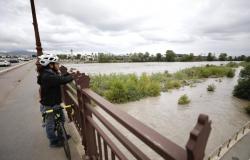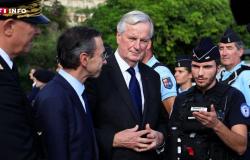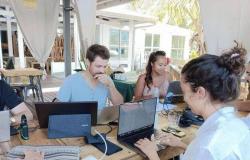Susan Neiman’s reflections on maturity, the intimate memories of Salman Rushdie, the fight of Denis Mukwege, Nobel Peace Prize winner, against sexual violence against women… Here is our selection of books to read by the fire this fall.
Published on October 18, 2024 at 5:32 p.m.
“Growing Up,” by Susan Neiman

There was nothing blue about her; It was around the age of 60 that Susan Neiman decided to write To grow, published in 2016 in the United States. Or the age at which widespread social pressure urges you to bow out and return to the backstage, after having convinced yourself that nothing very exciting will ever happen again on the stage of your life… But it is quite the opposite that occurred for the American philosopher, extremely happy with her existence and the new possibilities offered to her. Armed with her favorite thinkers (Rousseau, Kant and Arendt), this Enlightenment specialist decided to deny the idea that youth is the most beautiful age of life, followed by a terrifying decline.. — J.Ce.
Ed. Premier Parallel Pocket, €12.90.
Read our review
“Growing Up: In Praise of Adulthood in an Age that Infantilizes Us,” by Susan Neiman
“Languages of truth. Essays 2003-2020”, by Salman Rushdie


Responding to a questionnaire from Proust, to the question: “Where would you like to live?” “, Salman Rushdie says: “On a library shelf. Forever.” The questionnaire closes the volume of essays through which the writer seems to come to give us his news. Published in 2021 in the United States, Languages of truth brings together texts and conferences dating from 2003 to 2020 which remind us how lively, clear and incisive his thoughts and his voice are. Let him focus on talking about his journey as a writer, praising the elders who inspired him and the friends who left him prematurely. — Na.C.
Ed. Babel, €10.90.
Read our review
“Languages of truth. Essays 2003-2020”, by Salman Rushdie
“The Strength of Women”, by Denis Mukwege


Even before the Nobel Prize was awarded to him in 2018, Denis Mukwege was known as “the man who fixes women”. For more than twenty years, this surgeon-gynecologist and his team have treated women who are victims of massive sexual violence in his country, the Democratic Republic of Congo, which is plagued by armed conflicts and looting. In his powerful book, The Strength of Women, he embraces in the same story the hard work as a doctor that he carries out at the risk of his life and his fight so that survivors of sexual violence around the world obtain justice. A voice that carries. — V.H. & E.Sk.
Ed. Current Folio, €9.40.
Also read our big interview
Denis Mukwege, Nobel Peace Prize winner: “Rape is a weapon of mass destruction”
“A History of Inequalities”, by Walter Scheidel


In 2015, the 62 richest people owned capital equivalent to that of some 3.5 billion individuals (the poorest half of humanity). And the Covid crisis has not disrupted the pattern, on the contrary. Such levels of inequality seem to be unprecedented… However, they are perhaps not unprecedented: “Two thousand years ago, in the Roman Empire, the largest private fortunes were about 1.5 million times the average annual income per capita — roughly the same ratio as Bill Gates to the American current means”, Walter Scheidel teaches us in A history of inequalities, sum published in the United States in 2017. This professor of history at Stanford University, specialist in Rome, paints a perspective that embraces all regions and all eras, providing us with crucial lessons for ours. — Y.B
Ed. Babel, €14.90.
Read our article
Inequalities? They date from prehistory!
“The Culture of Incest”, Collective led by Iris Brey and Juliet Drouar


A book “urgent, vibrant, raw sometimes”, announces the back cover… A collective and hybrid book, directed by Iris Brey and Juliet Drouar, which confronts the reality of incest, with courage and anger – while also carrying its share of weaknesses and shortcuts. A tragic book which was overtaken by the gravity of its subject, this day in October 2021 when one of its authors, Tal Piterbraut-Merx, killed himself… Taboo supposed to be nowhere, incest actually turns out to be everywhere, collective trauma in the form of “internal disaster”, which affects one in ten French people, or 6.7 million victims (incested by men in the vast majority). — J.Ce.
Ed. Points, €7.90.
Read our review
“The Culture of Incest”
“Like a flock of starlings”, by Giorgio Parisi


We would love to imagine them whispering delicate instructions into each other’s ears. “To the left!” U-turn, right! » Like an agile and impetuous military battalion, endowed with prodigious sensitivity and exceptional listening skills. From November to March, you should see the starlings, by the hundreds of thousands, sometimes by the millions, drawing their volutes in the twilight and glowing skies of Europe. Giorgio Parisi was scanning the Roman sky when he suddenly wanted to understand what was there saw such fabulous things. “Even in the face of pure beauty, the professional deformation of the scientist sometimes takes over and gives rise to a cascade of questions in him,” says Parisi, Nobel Prize winner in 2021, in Like a flock of starlings, book on his memories as a researcher. — SE
Ed. Champs Sciences – Flammarion, €9.50.
Read our article
Flight of starlings: but how do they coordinate their fascinating dance?
“For a pirate ecology”, by Fatima Ouassak


How do we measure the health of a democracy? HAS “the quality of life of ordinary men and women”, hammered Nelson Mandela. We want to paraphrase the formula to summarize Fatima Ouassak’s powerful and salutary essay: just like the quality of a democracy, that of political ecology is measured by the care and consideration given to the most vulnerable, the most disadvantaged, to the most peripheral. And it is clear the extent of the failure – abysmal, inconceivable. Ecology, writes the political scientist, is withering away through its inability to address the working classes, the very ones who are nevertheless on the front line, concentrated in the most polluted territories, the most exposed to noise and heat, where industrial food also wreaks the most havoc. — WZ
Ed. Points, €7.90.
Read our review
“For a pirate ecology”, by Fatima Ouassak
“In the Name of Black People”, by Robert Penn Warren


In 1964, Robert Penn Warren (1905-1989), Pulitzer Prize for his novel The King’s Fools (1947) and double winner of the same prize for poetry, in 1958 and 1979, conducted interviews with numerous activists and leaders about the civil rights movement in the United States. “I wrote this book because I was looking for information, he notes, live, on them […] which make the Black Revolution what it is: one of the most spectacular episodes in American history. » The most tragic too, as the specters of the Civil War and slavery still condition consciences and ways of life. — G.H.
Ed. Pocket, €12.40.
Read our review
“In the Name of Black People”, by Robert Penn Warren
“Modernity is in the meadow”, by Sarah Farmer


For a long time, peasants were ashamed of the image they projected: backward French people, with their feet in the mud, stuck at the gates of modernity in a world without dishwashers or living rooms. At the end of the Second World War, France was under construction and the agricultural world was called upon to transform itself from top to bottom, in order to increase its productivity tenfold. But as the small peasantry disappears in favor of mechanized agriculture, a strong nostalgic feeling spreads in the collective imagination. Living in the French countryside becomes a powerful fantasy, including abroad. A fine connoisseur of France where she stays regularly, notably on a farm in Limousin, the American historian Sarah Farmer explores the different faces of this rural ideal, sometimes attachment to an eternal France, sometimes utopia of community life opening horizons. — M.Bel.
Ed. Champs Histoire – Flammarion, €9.50.
Read our article
Living in the countryside, the story of a very French fantasy
“The K Hypothesis”, by Aurélien Barrau


How to put an end to inertia? And free ourselves from this “way of inhabiting the world” which inexorably causes its artificialization and the collapse of life? Astrophysicist Aurélien Barrau may dedicate his professional life to the physics of black holes and the theory of general relativity, but he nonetheless keeps his eyes fixed on our planet, our civilization. “losing meaning” and freewheeling, as subject to a “bewitchment”… that it is high time to break up. In his latest work, Hypothesis Kthis figure of ecology offers a reflection on the role that the scientific community could play in the face of the greatest challenge in our history. — M.Bel.
Ed. The Pocket Book, €7.70.
Read our article
Aurélien Barrau: “Science constitutes both the jewel and the scourge of the West”






